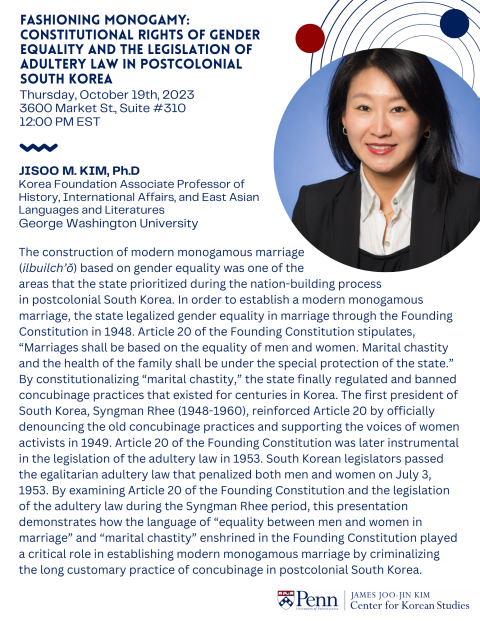
Korean Studies Colloquium
3600 Market Street, Suite 310 Philadelphia, PA 19104
The construction of modern monogamous marriage (ilbuilch’ŏ) based on gender equality was one of the areas that the state prioritized during the nation-building process in postcolonial South Korea. In order to establish a modern monogamous marriage, the state legalized gender equality in marriage through the Founding Constitution in 1948. Article 20 of the Founding Constitution stipulates, “Marriages shall be based on the equality of men and women. Marital chastity and the health of the family shall be under the special protection of the state.” By constitutionalizing “marital chastity,” the state finally regulated and banned concubinage practices that existed for centuries in Korea. The first president of South Korea, Syngman Rhee (1948-1960), reinforced Article 20 by officially denouncing the old concubinage practices and supporting the voices of women activists in 1949. Article 20 of the Founding Constitution was later instrumental in the legislation of the adultery law in 1953. South Korean legislators passed the egalitarian adultery law that penalized both men and women on July 3, 1953. By examining Article 20 of the Founding Constitution and the legislation of the adultery law during the Syngman Rhee period, this presentation demonstrates how the language of “equality between men and women in marriage” and “marital chastity” enshrined in the Founding Constitution played a critical role in establishing modern monogamous marriage by criminalizing the long customary practice of concubinage in postcolonial South Korea.
Jisoo M. Kim is Korea Foundation Associate Professor of History, International Affairs, and East Asian Languages and Literatures at George Washington University. She is Founding Director of the GW Institute for Korean Studies (2017-Present) and Founding Co-Director of the East Asia National Resource Center (2018-Present). She also serves as Editor-in-Chief of the Journal of Korean Studies. She specializes in gender, sexuality, law, emotions, and affect in Korean history. She is the author of The Emotions of Justice: Gender, Status, and Legal Performance in Chosŏn Korea (University of Washington Press, 2016), which was awarded the 2017 James Palais Prize of the Association for Asian Studies. She is also the co-editor of The Great East Asian War and the Birth of the Korean Nation by JaHyun Kim Haboush (Columbia University Press, 2016). She is currently working on a book project tentatively entitled Criminalization of Intimacy: Adultery Law and the Making of Modern Monogamous Marriage in Korea. She received her M.A., M.Phil., and Ph.D. in East Asian Languages and Cultures from Columbia University.
 James Joo-Jin Kim Center for Korean Studies
James Joo-Jin Kim Center for Korean Studies